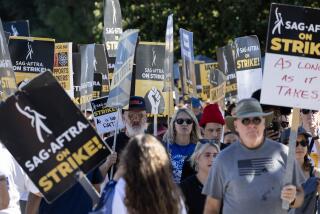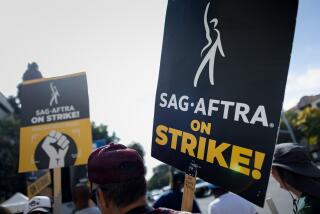Health Leaders Tentatively OK Tobacco Deal
- Share via
WASHINGTON — Leaders of major public health organizations gave tentative approval Thursday to a proposed tobacco litigation settlement, and they publicly released further details of the settlement negotiations.
The proposed deal calls for tougher warning labels on cigarette packs, stringent advertising restrictions and a multibillion-dollar smoking-cessation campaign financed by the $50-billion-a-year industry. In return, the industry would receive a cap on the amount of damages that it has to pay to settle the litigation.
The industry also would accept tough state laws on secondhand smoke, drop its court challenge to FDA regulatory authority and turn over internal research documents it has kept secret for years, according to an outline of the deal given to reporters by Matt Myers, co-director of the Campaign for Tobacco-Free Kids, a key player in the negotiations.
Lonnie Bristow, immediate past president of the American Medical Assn., said at a news conference that the agreement’s current provisions present an unprecedented opportunity to bring tobacco’s “evil empire” under control.
John Seffrin, chief executive of the American Cancer Society, declared that the pending settlement could save a million lives of people currently under the age of 20 who would otherwise die as a result of smoking.
Nonetheless, the tobacco control advocates said they were withholding final endorsement of any pact until they have seen all the fine print.
They noted that two major sticking points remain: how much authority the Food and Drug Administration will have to regulate nicotine, the critical component of cigarettes that leads to addiction, and what protection the industry will get from future lawsuits. Under the proposed pact, individual smokers would still be permitted to sue the cigarette companies, but class actions against them would be barred.
The favorable comments by Myers, Bristow, Seffrin and Dudley Haffner, chief executive of the American Heart Assn., could give a big boost to any settlement that would ultimately have to be approved by Congress.
The developments Thursday represented a new stage in what has become an intense public relations battle over the shape and contents of the proposed settlement. Proponents and skeptics alike are trying to capture the hearts and minds of Congress, President Clinton and the American public on what would constitute an acceptable settlement.
Indeed, one of the key skeptics of a deal weighed in heavily Thursday. Rep. Henry Waxman (D-Calif.), a veteran tobacco foe, charged that the cigarette companies “want a settlement that would be the biggest cover-up of all.”
He released internal documents showing that Liggett & Myers had by the late 1970s developed a safer cigarette--one that animal experiments showed could “dramatically reduce tumors”--but decided not to market them on the advice of lawyers.
Selling the new cigarette “may incite accelerated cancer litigation, which may, in turn, result in infinite liability,” Joseph Greer, Liggett’s general counsel wrote in an Oct. 18, 1977, memo.
The documents show that Liggett spent $13 million to add more nitrogen and palladium, a metal, into tobacco, yielding a cigarette that could “dramatically reduce” tumors in animals experiments, according to a memo stamped “confidential.”
Waxman said that every industry document of this kind must be disclosed in order for a settlement to be acceptable, including memos that could implicate attorneys in fraud or crimes.
Meanwhile in Boston, Liggett Chairman Bennett LeBow testified in support of a Massachusetts law being challenged in federal court by the industry that would require cigarette companies to reveal all the cancer-causing chemicals in their products. “We believe firmly that we and other manufacturers can comply easily with these requirements,” he said.
LeBow broke with the other tobacco companies, admitted that cigarettes are addictive and reached a separate settlement with state attorneys general in March. As part of that agreement, Liggett has turned over thousands of documents, including those released by Waxman on Thursday.
The other companies are vigorously fighting the release of the most sensitive of those documents in court actions across the country, claiming that the documents represent privileged confidential communications between a lawyer and client.
Waxman asserted that this claim was a sham designed to keep the public from learning the truth about the health hazards of cigarettes and how the companies had engaged in a long-term campaign of deception.
The documents Waxman released also show that Liggett’s lawyers prevented Liggett managers from making public statements about health risks that would “contradict our position that there is no scientific proof of any cause and effect relationship between smoking and health.”
Waxman stressed that these documents provided only a glimpse of the role of tobacco lawyers and noted that all the other major cigarette companies are vigorously resisting the disclosure of thousands of other “joint defense” documents turned over by Liggett that could show they participated in fraudulent or criminal activities.
“It is essential that any tobacco settlement provide for full disclosure by the tobacco companies--including the disclosure of attorney-client documents that contain evidence of criminal or fraudulent behavior,” Waxman said.
In response to a question, Myers said the proposed settlement calls for “disclosure of every document that would have been disclosed if the attorneys general continued to pursue their litigation.”
However, other sources participating in the negotiations said that while the companies are willing to turn over scientific research documents, they are resisting turning over documents like the Greer memo that could damage them in civil suits or even have criminal ramifications.
Although all the public health advocates were upbeat about the prospects of a settlement, none of them had anything remotely kind to say about the cigarette companies. Myers said he thought a combination of factors--including leaked internal documents, class-action suits and, most importantly, the 37 attorney general suits seeking billions in recompense for state expenditures treating sick smokers--brought the industry to the bargaining table.
While the terms of the proposed deal are not final, sources have said the damages cap would be $4 billion a year and that any money in this fund that was not paid out would be rolled over to finance anti-smoking programs.
Myers and the others with him all emphasized that there was a need to seize the opportunity to settle now because even if lawsuits were successful, appeals could drag on for years. In the meantime, they said, 420,000 Americans a year would continue to die from smoking and 3,000 teenagers a day would continue to start smoking.
Myers readily acknowledged that the issue of just how much money the industry would fork over, previously reported in the range of $300 billion to $375 billion, is not resolved.
Among the other key parts of the deal, Myers said, would be enactment of legislation that would add significant protection to the public from secondhand smoke and a provision that would subject the industry to severe penalties if youth tobacco use fails to drop by 30% in five years, 50% in seven years and 60% in 10 years.
However, former Surgeon Gen. C. Everett Koop called the news conference “premature.” Earlier this week, Koop and former FDA Commissioner David Kessler sent a letter to Clinton urging him to refrain from taking a stand on any proposed settlement until a special advisory panel on tobacco they are co-chairing completes its work in early July. On Wednesday, White House Press Secretary Mike McCurry said Clinton would comply with that request.
On Thursday, Koop said he was disappointed that representatives of some of the major organizations that are part of the advisory panel were “holding their own press conferences” before the panel’s work is done, “especially at a time when none of us really know what all the elements of a settlement would be.”
* JOINING THE BATTLE
California became the 37th state to file suit against the tobacco industry. A3
More to Read
Sign up for Essential California
The most important California stories and recommendations in your inbox every morning.
You may occasionally receive promotional content from the Los Angeles Times.










